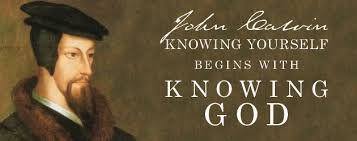
Calvin begins his Institutes by arguing that there are two parts to sound wisdom. The first part is the knowledge of God, and the second part is the knowledge of ourselves. Both types of knowledge are important. Without the former, the latter is lost, and without the latter, the former is lost. But why is this so?
So long as we are content in ourselves–that is, so long as we don’t truly know ourselves, we’re quite content to remain in our current condition. It’s only when we realize that we are somehow lacking–it’s when we realize that we don’t have all of the answers–that we turn our gaze from inward to outward.
Calvin writes, “Thus, from the feeling of our own ignorance, vanity, poverty, infirmity, and–what is more–depravity and corruption, we recognize that the true light of wisdom, sound virtue, full abundance of every good, and purity of righteousness rest in the Lord alone” (1.1.1).
On the other hand, it’s when we truly know God in all of his perfections that we finally realize that we have blindspots in our lives. Our pride disguises our own failings and shortcomings. We compare ourselves to others, and we thus feel ourselves superior because–in our eyes, at least–we’re “better” than our neighbors.
We miss the fact that our neighbor isn’t the measuring stick, but God and his perfection is the measuring stick, and we all fall woefully short on that account.
Calvin writes, “As long as we do not look beyond the earth, being quite content with our own righteousness, wisdom, and virtue, we flatter ourselves most sweetly, and fancy ourselves demigods. Suppose we but once begin to raise our thoughts to God, and to ponder his nature, and how completely perfect are his righteousness, wisdom, and power–the straightedge to which we must be shaped. Then, what masquerading earlier as righteousness was pleasing in us will soon grow filthy in its consummate wickedness” (1.1.2).
We will never truly know ourselves until we come face to face with who God is, and we’ll never truly know God until we know something of ourselves, but let’s start the journey by knowing who God is.